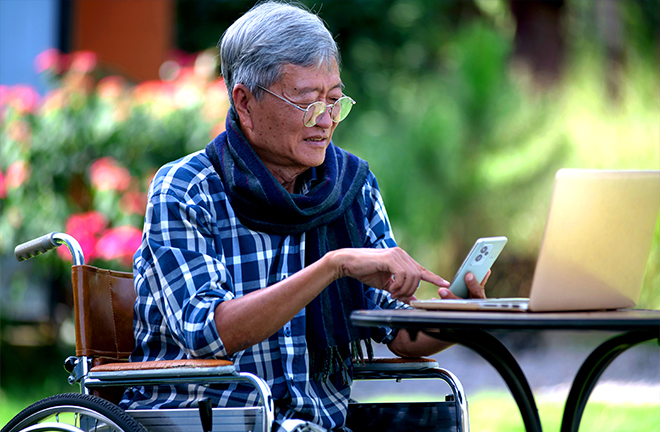Experience transmission of the elderly in digital age

An elderly person working on his cellphone and laptop Photo: TUCHONG
Digital back-feeding, in which young people teach digital media skills to the elderly, has emerged as a new mode of intergenerational communication in contemporary Chinese society, representing the modern embodiment of cultural back-feeding in the digital age. Viewing the elderly merely as recipients of care risks overlooking their agency, creativity and valuable life experiences.
Experience unique to the elderly
The various experiences and social practices that the elderly have accumulated over the course of their lives are not readily accessible by younger generations through digital media. They represent valuable resources that the elderly can contribute to society, and the author categorizes them into four main types:
The first is career and knowledge experience. The elderly have undergone role transitions from novices to seasoned workers and have navigated the ups and downs of their careers, acquiring a wealth of professional skills and interpersonal strategies along the way. In particular, in the fields of ancient literature, traditional Chinese medicine, and other fields of refined traditional Chinese culture, the knowledge amassed by the elderly far surpasses what younger generations can easily achieve.
The second is retirement and aging experience. During the 14th Five-Year Plan period (2021–2025), an average of eight million people in China would enter retirement each year. Retirement and aging are issues that everyone and every family must address. The ways in which the elderly navigate life stage transitions, as well as their experiences of retired life, address the gap in elderly representation within digital media.
The third is tradition and ritual experience. Chinese society, with its legacy of Confucian values, cannot ignore traditional etiquette and customs. The elderly, with their many years of understanding and practical experience, can offer valuable guidance to younger generations, supplementing their life experiences.
The fourth is history and memory experience. The course of an individual’s life is intertwined with the course of social development. In particular, the generation born in the 1930s and 1940s witnessed the founding of the People’s Republic of China, reform and opening up, and other major events, as well as the transformation of Chinese society. Their lives offer a window into China’s social transformation, providing a diversity of perspectives.
Experience transmission in families
The family is an important setting for intergenerational interaction and experience transmission. Through interviews with families, researchers have found that the elders still maintain an authoritative position and discourse advantage when it comes to traditional customs and life experiences. For example, in WeChat chats, family elders often give younger members guidance based on their personal experience and understanding, while younger family members actively seek advice from them.
Although younger generations often view the perspectives of elders as outdated, the experiences of older adults still hold significant influence and have subtly permeated family dynamics. The words and deeds of the elders contribute to each family’s unique cultural fabric, which has a profound impact on the cognitive frameworks of younger generations. It is through interactions with elders that young people develop a concrete understanding of aging. Family interviews also reveal that the more frequent the experience transmission, the higher the perceived status of the elderly, and the stronger their sense of participation in family affairs.
Media empowerment
Digital media begins to empower the elderly as they acquire basic digital media literacy. Some elderly people have transitioned from passive recipients of media representation to active creators of their own identities. They use social media to showcase their aging life to society, and share personal experiences and life insights to express their emotions and participate in social affairs. The rise of “silver-haired influencers” has greatly improved the social visibility of the elderly, breaking the stereotypes of decline and invisibility associated with aging.
Equally important is the intergenerational communication of the experience of aging. Some individuals approaching old age observe the lifestyles of even older adults to gain insights into what aging entails. This process provides them with both spiritual encouragement and practical guidance, helping them navigate the transition into later life more effectively.
Zhang Huan is a research fellow from the Research Center for Convergence Media at Nankai University.
Edited by YANG LANLAN
